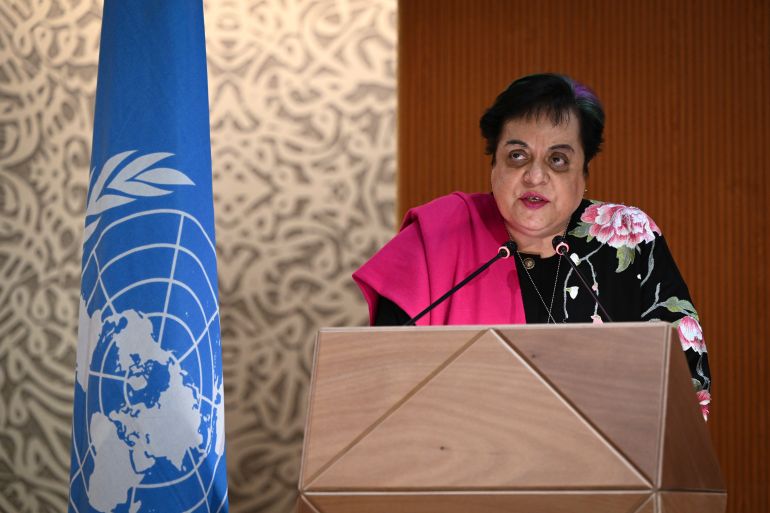Why have dozens of leaders quit Imran Khan’s party in Pakistan?
Since Khan’s arrest and the violence that followed, more than two dozen PTI leaders have quit the beleaguered party.

Islamabad, Pakistan – Since his controversial arrest and the violence that followed it, more than two dozen leaders from former Pakistani Prime Minister Imran Khan’s Tehreek-e-Insaf (PTI) have quit the party, which blames the continuing government crackdown for the exodus.
In the biggest setback for Khan’s party since the exodus began, Shireen Mazari left the PTI on Tuesday after the former human rights minister was detained several times since she was first arrested on May 12 over the deadly protests that followed Khan’s arrest.
Keep reading
list of 4 itemsPakistan’s Imran Khan gets bail from anti-terrorism court
Journalist Imran Riaz Khan still missing in Pakistan
Pakistan to try those who attacked military under army law: PM
Addressing a news conference at her Islamabad residence on Tuesday evening, the 57-year-old politician condemned the violence, including the attacks on military installations, and said she will not continue in politics.
“The constant release and arrest and the ordeal it put my daughter Imaan under had an impact on my health, too. Due to these reasons, I have decided I will quit active politics. And I want to add that from today onwards, I will not be a part of PTI or any other political party,” she said.
As more politicians jumped ship, PTI chief Khan tweeted: “We had all heard about forced marriages in Pakistan but for PTI a new phenomenon has emerged, forced divorces.”
We had all heard about forced marriages in Pakistan but for PTI a new phenomenon has emerged , forced divorces.
Also wondering where have all the human rights organizations in the country disappeared.
— Imran Khan (@ImranKhanPTI) May 23, 2023
The desertions compound Khan’s problems as the 70-year-old politician battles more than 100 legal cases and is trying to avoid being rearrested.
Speaking to reporters at a court in Islamabad on Tuesday, Khan alleged his party leaders were being coerced to leave, without saying who was doing it.
“People are not quitting, they are being forced to leave the party at gunpoint,” he said. “Political parties cannot be dismantled through such tactics.”
Shibli Faraz, a key Khan aide, told Al Jazeera that while it was unfortunate that some “good people” were forced to leave the party, he also called it a blessing.
“There were some people who were opportunists and were not the asset for the party but a liability. It is the people who matter and not the leadership, except Imran Khan himself. He holds the main pull and that is how our people gain strength from him,” Faraz said.
He said the defections will not affect the PTI in upcoming general and provincial elections, calling Khan the most popular leader in the country.
“All that has been happening in the country is being done to avoid elections because the government fears the PTI will sweep it. If it is democratic society, let people decide who will rule over them,” Faraz said.
Khan was removed from power after he lost a confidence vote in parliament in April last year. Since then, he has been holding a nationwide campaign to demand immediate elections, due by October this year.
‘Establishment’ blamed
According to experts, due to the Pakistani military’s oversized role in domestic politics, defections from political parties are not a new phenomenon.
They say such defections happen at the behest of the “establishment” – a euphemism for the army that has directly ruled over the country for nearly three decades.
Sameen Mohsin Ali, lecturer at the University of Birmingham in the United Kingdom, told Al Jazeera that political careers in Pakistan are usually built around “opportunistic and not ideological lines”.
“Their decisions on when to stay and when to go is shaped not by party leanings, but by political logic or dynamics in their constituencies and their prospects for power. This is why we see politicians switching towards the party with the best chance of winning national or provincial governments,” she told Al Jazeera.
Political analyst Benazir Shah said while some politicians “abandoning the PTI ship” were known for their “toxic brand of politics”, their decision to remain in politics should be decided by the common people.
“The voters should have the right and should be given the opportunity to throw such politicians out of the political arena. But as of now, it seems the establishment is making that decision for them, deciding which political party can and cannot contest elections,” Shah told Al Jazeera.
Shah said it was not easy to predict how politicians leaving the PTI will affect the party in future.
“The establishment has in the past tried to break up political parties such as the PPP [Pakistan People’s Party] and the PMLN [Pakistan Muslim League-Nawaz]. But the plan rarely ever worked. These political parties proved to be resilient due to a loyal party base, which was willing to endure long jail terms and court cases for the leadership,” the Lahore-based analyst said.
But Asma Faiz, associate professor of political science at Lahore University of Management Science, was more sceptical of the PTI’s chances in future elections.
“These defections can have a dampening effect on PTI’s performance in the next elections. There is no doubt that Khan has massive support among the people, but he needs strong candidates who bring their own vote bank with them.”